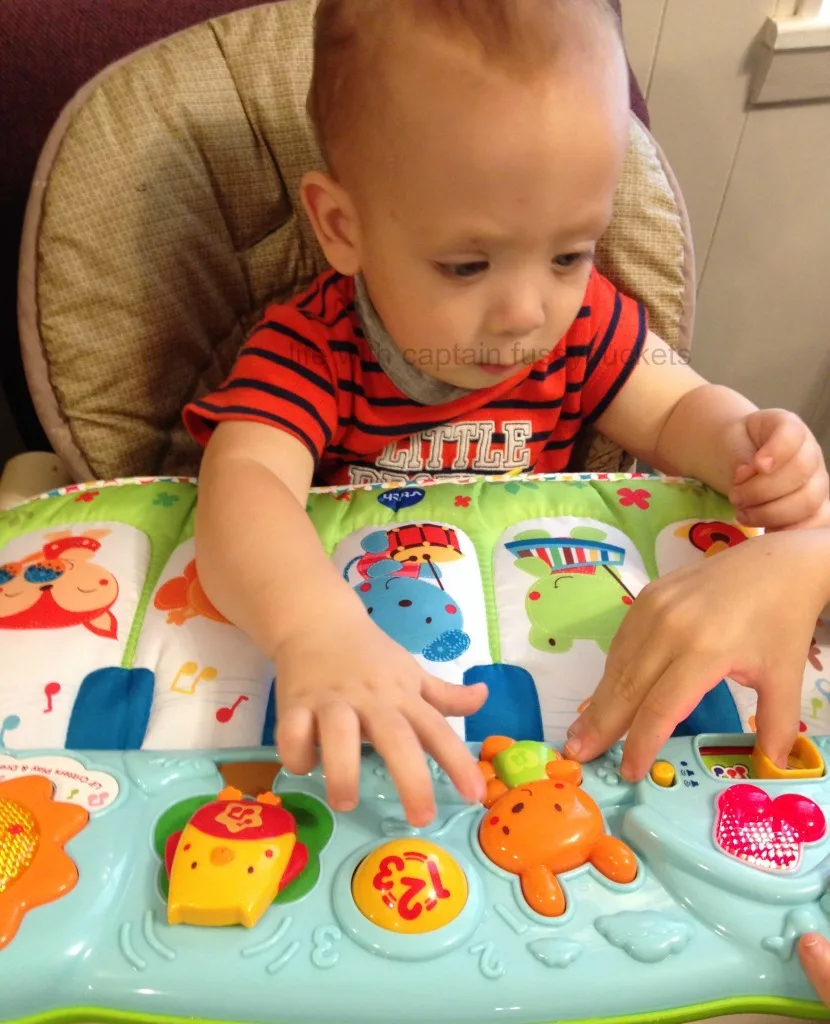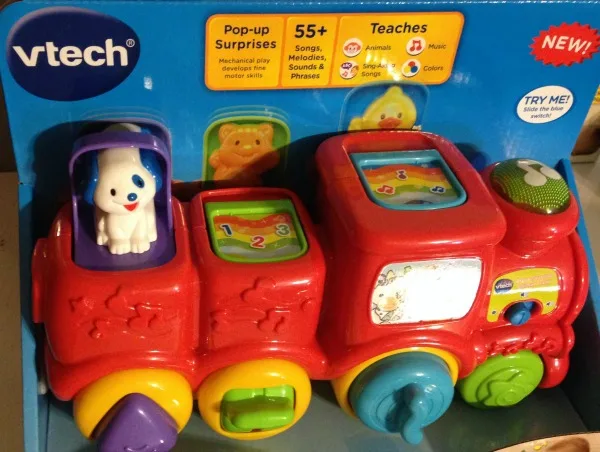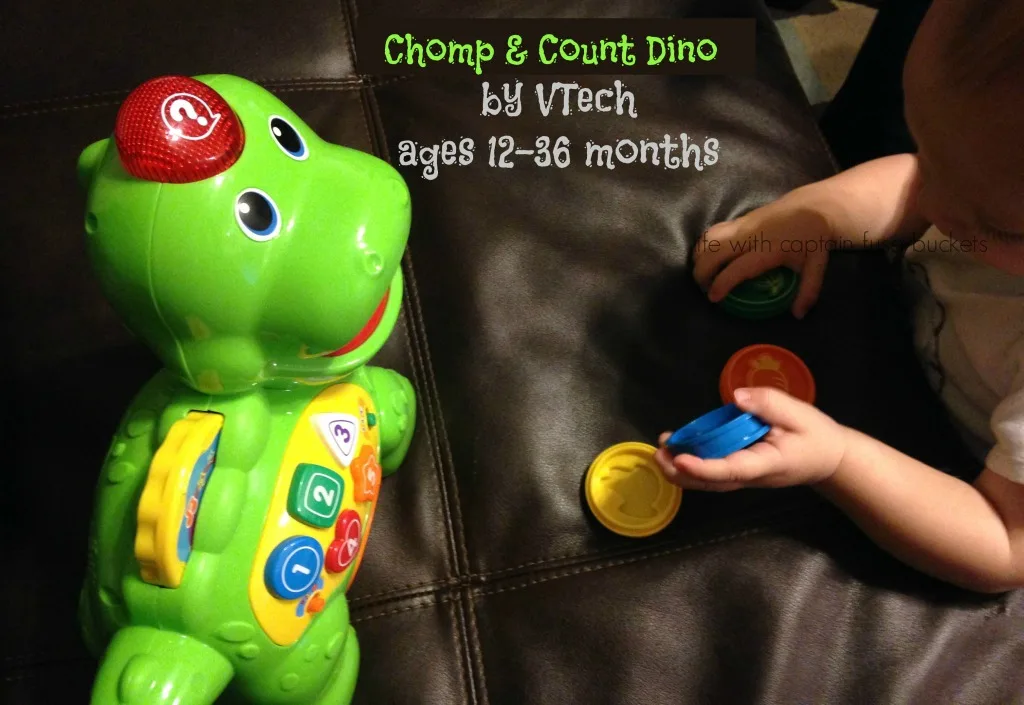This milestones post was brought to you by VTech. All opinions are mine. The VTech product, giveaway, and information have been provided by VTech.
Baby Brother turned ONE last week! In some ways, it seems like just yesterday that we found out we were having a baby and in others, it seems like oh so long ago. Many nights with little sleep will do that to you, I have found. (No, still not sleeping through the night, but that's ok!) He is his own little person and is doing things at his own pace. It has been fun watching him reach the milestones. For awhile he wasn't into mobility. He rolled over about three times before 6 months old and I really began to worry. But, once he learned that he could move, he took off and hasn't stopped. Rolling over, scooting, crawling, and after he turned 11 months old, walking! And his mimicking sounds and learning to talk is really taking off now, too. Oh and his temper...wow. He is definitely a toddler! His favorite thing is probably music, creating it, listening to it, and dancing to it, too!

Baby Brother is like any toddler...into anything and everything. I like to have toys available to him that encourage learning and thinking and VTech toys do just that. I never really thought about what goes in to toy making, but I recently learned that VTech works closely with a panel of children's learning experts as they develop new toys that children will love and learn from! Milestones are broken down into three categories:
- Language and Cognitive
- Social and Emotional Development
- Physical and Motor
It's important to remember that each child is different and each child learns, develops, and reaches milestones at their own pace! VTech clearly describes recommended age, milestones, and educational aspects of each toy they develop. Dr. Lise Eliot is Associate Professor of Neuroscience at The Chicago Medical School of Rosalind Franklin University of Medicine & Science. A Chicago native, she received an A.B. degree from Harvard University, a Ph.D. from Columbia University, and did post-doctoral research at Baylor College of Medicine in Houston. In addition to more than 50 published peer-reviewed journal articles and magazine pieces on children’s brain and mental development, Dr. Eliot has authored two books. Dr. Eliot has answered a few questions about children and milestones and I have included her answers below:
Dr. Lise Eliot is Associate Professor of Neuroscience at The Chicago Medical School of Rosalind Franklin University of Medicine & Science. A Chicago native, she received an A.B. degree from Harvard University, a Ph.D. from Columbia University, and did post-doctoral research at Baylor College of Medicine in Houston. In addition to more than 50 published peer-reviewed journal articles and magazine pieces on children’s brain and mental development, Dr. Eliot has authored two books. Dr. Eliot has answered a few questions about children and milestones and I have included her answers below:
Q. As a parent, what are your suggestions on things I can do with my child to help them develop their social and emotional skills? What are ways I can help my child to get the most of their playtime?
A. Social-emotional skills are the bedrock of learning, so good for you for taking an interest in cultivating them in your child. The best way to promote emotional and interpersonal skills is through interaction--reading, singing and lots of talking with your child. Make eye contact with him or her. Laugh together. Direct your child's attention to interesting things in your environment. When you read together, ask your child questions about the characters' thoughts and feelings. This can help build empathy. Another way to think about it is to use books or videos as a stepping stone for dialogue with your child. It's the two-way, back-and-forth sharing of words and feelings that build emotional and communication skills. Playtime has ample opportunity to do this, whether you are visiting the zoo, finger-painting, or playing with toys. Take every opportunity to talk about the feelings and relationships among characters your child is drawing or playing with.
Q. As a stay-at-home mom, I feel like I'm responsible for most of my toddler's learning the first couple of years. How can I ensure that I'm teaching him all he needs to know? What are the best games or play to help him learn basics things like numbers, colors, words, etc.?
A. Children learn through play, so almost any activity is a learning opportunity for your child. Show your child how to count banana slices at lunch time, or toothbrush strokes at bedtime. Read ABC books to him to teach letter sounds and recognition. But don't worry too much about academic skills in younger children. Most important at this age is for children to learn the joy of discovery. Try to avoid drilling exercises (like flashcards) and instead focus on learning about the real world around him--animals, people, vehicles, music, art--whatever you encounter through books or the world outside that excites your child. When kids find a passion and get absorbed in it, early literacy and number skills follow easily.
Q. What if it seems like your child isn't reaching a particular milestone, what can you do to facilitate the learning of it? While every child is different, are there any Milestones (when not achieved on schedule) a parent should be concerned about?
A. It's important for parents to know what milestones to expect, because failure to reach them can be a warning sign of a developmental delay. For social skills, we like to see babies making eye contact early on, and worry if it doesn't happen by 3 months or age, or if s/he is not sharing facial expressions or some other kind of back-and-forth communication by 9 months. For language skills, we worry when children are saying no words by 16 months, or only a few words at 2 years, and when there is any loss of communication ability at any age. For motor skills, it is concerning if a baby cannot bring an object to his or her mouth by 7 months, sit independently by 10 months, or walk by 18 months. If your child isn’t reaching these milestones, talk to your pediatrician, who may propose additional testing and exercises you can do with your child at home to promote his or her development.
Q. My 2 year old (26 months to be exact) barely talks unless she wants to. She has two older siblings who tend to speak for her. She can string a few words together like "me up" or "love you." How can we encourage her to talk more and what VTech products would be most beneficial for her?
A. There's a simple equation to verbal development: "Language in = Language out" The more words you and others address to your child, the larger her own vocabulary will eventually be. You are right that younger children sometimes do have trouble getting a word in edgewise in a big family. Find opportunities when your daughter can be the only one speaking. Try to carve out some one-on-one time, when you are just focused on each other, and make sure to listen and respond to every word or babble she makes, acting as if you understand her. Imitate her words and sounds and offer lots of praise. Just giving your child the confidence that she is being heard will provide great reinforcement to encourage her to speak more.
Also, VTech's infant toys can promote this language development since most produce simple words or phrases that babies love to control. Toys such as Cody The Smart Cub™ and Cora The Smart Cub™ introduce children to first words, emotions, stories, sing-alongs, and more.
Q. How do doctors come up with specific milestones for each age group? What are some milestones for older age groups (up to age 9)?
A. Infant developmental milestones have been cataloged by studying thousands of babies from all walks of life. In healthy children, the various milestones emerge in a predictable sequence and time, give or take a few weeks or months. This predictable pattern is due to the maturation sequence of the developing brain, along with the typical sequence of practice most babies engage in, given their gradually growing strength and coordination. Some milestones you can look for as your child gets older include: able to draw a circle at age 3, asking lots of "Why" questions at age 4, knowing his or her letters at age 5, tying shoes at age 6, reading aloud fluently at age 7, and a big spurt of social independence beginning at 8-9 .
Q. What are some of the benefits of teaching children sign language at a young age to help improved their cognitive, motor and social skills? How can teaching sign language to my child help promote more than language development? How can sign language help stimulate a child’s brain in other ways?
A. The research on sign language is not terribly strong, but enough has been done to indicate that sign language may benefit your child's overall language development. The more words addressed to babies, whether spoken or gestured, the faster their own vocabulary growth. Sign language also has the advantage that it is easier for babies to communicate using simple gestures, compared to oral articulation. So especially in the first year of life, some babies find it easier to communicate their needs when taught simple signs, and may express less frustration than infants who were not exposed to baby signing.

Baby Brother has really taken a liking to the VTech Chomp & Count Dino. He learned how to "feed" the dinosaur and loves to play with him! It also has counting games and D loves to help him with that, too. It's a fun toy that has kept Baby Brother engaged and learning. And I love it because as Baby Brother grows, he will learn how to use this toy more and learn from it, too!
What milestone has your child reached most recently?
Follow VTech on Twitter and Facebook!

Lesley F
Thursday 11th of December 2014
She just started pulling herself up which is exciting
Jessica C
Thursday 11th of December 2014
Being able to have full conversations with both my kids feels great :)
Ashley Busse
Thursday 11th of December 2014
My youngest is starting to crawl now- pretty exciting stuff!
Sherry Conrad
Thursday 11th of December 2014
Gabriel saying brother as his first word. :D
Hesper Fry
Wednesday 10th of December 2014
When my daughter started saying words- it was so precious!